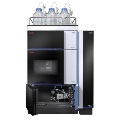Top Story
In recent years, liquid chromatography–tandem mass spectrometry (LC–MS-MS) methods have been increasingly adopted as a replacement for ligand-binding assays to monitor the fate of drugs in vivo. Such bioanalysis of protein-based pharmaceuticals (biopharmaceuticals) is more challenging, however, than it is for small-molecule drugs. Rainer Bischoff of the University of Groningen in the Netherlands has been exploring approaches to overcome these challenges. He recently spoke to us about this work. read more
advertisment
Join us for an exciting journey and find out how to increase analytical confidence in biopharmaceutical peptide mapping. This LIVE four-part series focuses on optimizing each step within a peptide mapping workflow. Several powerful, new technologies will be discussed that address and improve upon slower, less-reliable and highly variable methods currently used to examine biotherapeutics. The fastest route to outstanding reproducibility. Upgrade your maps!  Register NOW Register NOW
|
|
|
Subscribe Subscribers can enjoy each full issue of LCGC in print, or via LCGC apps.
subscription offers
|

|
|
|
|
Chromatography News
Researchers from the USA have developed a simple and derivatization-free gas chromatography (GC) method for the quantitative analysis of oleic acid and related fatty acids. read more
|
|
|
FEATURED ARTICLE
The technical requirements for a successful LC–MS–MS method for the quantitation of biopharmaceuticals are presented and the advantages and disadvantages compared to ligand-binding assays are evaluated. read more
|
|
|
FEATURED PRODUCT

|
The Thermo Scientific™ Vanquish™ UHPLC Platform delivers new benchmarks in accuracy, precision, and sensitivity, all in a truly biocompatible system. Find out how your lab could benefit
 here. here.
|
|
|
|
E-book
The introduction of UHPLC revolutionized bio/pharma analytical laboratories and advances in technology promise more for the future. In this e-book, experts explain recent advances in UHPLC, and the basics of glycan analysis.
Download e-book
|
|
|
e-App note
advertisment
The direct comparison of the SMART Digest kit with conventional in-solution protein digestion methods in this study showed no substantial difference for the mAb rituximab between the different approaches with respect to the data quality and information content obtained. Protein sequence coverage of 100% for rituximab could be achieved in only 15 minutes when using the SMART Digest kit.  Read more Read more
|
|
|
|
|
NEW WEBCAST
Thursday, October 27, 2016
8 am PDT | 11 am EDT | 4 pm BST | 5 pm CEST
|
|
|
|
|
|